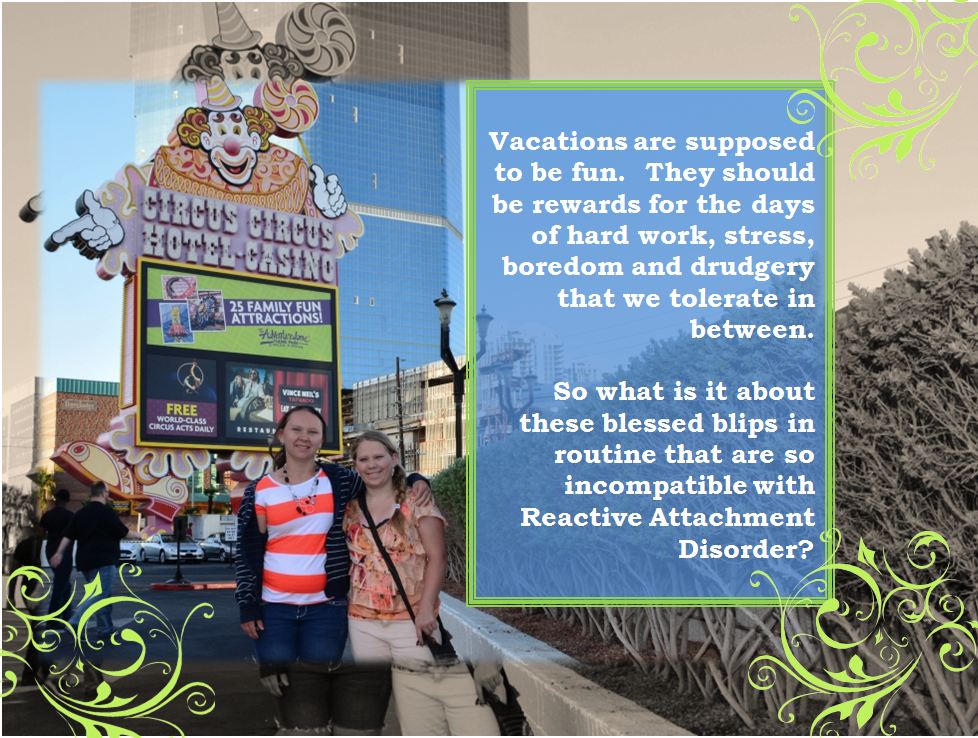Hypervigilance and Reactive Attachment Disorder: Vacations
Hypervigilance and Reactive Attachment Disorder make vacations the Devil! To this day I can’t make a sudden move near any of my children who have Reactive Attachment Disorder without them throwing up a guard and bracing for the knockout punch. Just the other day I reached for a glass in the cupboard and my daughter’s hands flew in front of her face. When I facetiously asked if she thought I was going to punch her, she grew agitated and told me that her first mother used to hit her, so that’s why she flinches all the time. Of course I already knew that. Even so, two years in an orphanage where she wasn’t abused, along with nine years in a home where no one hits her, hasn’t overridden instincts that she developed during her first three years. Try to sneak up on my daughter. No. Wait. Try to sneak up on a cougar, instead. I want you to have a fighting chance. Two of my daughters are intellectually challenged; presumably because of head injuries received during beatings from a mother who turned demonic when she drank. One of their sisters remains in a Russian institution, far too damaged to remove. My oldest daughter tells me that Lydia wasn’t like that until their mother beat her head on the ground. So… where does this hypervigilace come from? Ok. I’ll stop. My sarcastic side isn’t flattering. The point is that in most cases, hypervigilance and Reactive Attachment Disorder develop together, as survival skills. I realize that the disorder can happen without physical abuse, but it is still a survival skill. Who can remain sane when left psychologically broken as care givers leave, time after time after time? Watch for people that you care for and signs that they are going to leave. Watch and prepare yourself. Brace for the crash. Learn to discourage yourself from attaching as much as possible. Watch for the same type of separation that happened without exception, until the most current caregiver (parent) relationship. Watch for the family to fail. Watch for the home to disintegrate. Watch for signs of imminent physical abuse. Watch for signals that relationships might be ending. Watch. Watch! WATCH!!!
Confidence amidst hypervigilance and Reactive Attachment Disorder comes only because over time, observation backs up what caregivers tell them.
Your struggling child knows what lies behind every corner in their home. They know who visits the family. They know virtually every risk in the normal places that they attend on a daily or weekly basis. They learn to weigh the odds and to trust that they are safe, as they are told they will be in the home and other settings. But this confidence amidst hypervigilance and Reactive Attachment Disorder comes only because over time, observation backs up what caregivers tell them. Our children get established. They show improvement. They appear to be ready for more. What better way to reward them than with a vacation that has been earned by parents and children alike? I know. You’re shaking your head while watching me walk into the fan. It gets better. I took my daughters to amusement parks loaded with crowds of people; people none of us had ever seen before! Who was safe? Who did they need to watch? At least after a day of trying to be hypervigilant in a hyperactive amusement park, my daughter could get a good night’s sleep away from home, in a strange hotel, unfamiliar bed, all alone, in the dark.
The unfamiliar and often busy places of vacations agitate hypervigilance and Reactive Attachment Disorder.
The next day I took my daughters to a beach that was almost as crowded as the amusement park. OK. In retrospect, I get it. Swimming in the vastness of the ocean might not have been a psychological comfort. Crowds of unknown people in all shapes, sizes and various stages of dress and undress, littering the beach, must have piqued every hypervigilant cell in my daughter’s body. Our vacation “ramped down” with another day at a different but equally crowded amusement park, and then an afternoon and night in Las Vegas. Good grief! Vegas overwhelms ME! In normal, everyday places it is all my children with RAD can do to keep track of what concerns them. The unfamiliar and often busy places of vacations agitate hypervigilance and Reactive Attachment Disorder. Busy unfamiliar locations are torture, though my children don’t realize the problem. They say they want to go to such places. I believe they really do. Even so, four days of amusement parks, beaches and Circus Circus in Las Vegas was definitely more than a bit too much. I once had a business acquaintance who told me that paranoia is merely an increased sense of awareness. Perhaps he was right. My children that are affected by hypervigilance and Reactive Attachment Disorder are the ones who understand how bad family, home and life can get. I’m the naïve one. And if I’m going to be the best dad I can be to these children, I need to be better at parenting. I need to work a little bit harder at planning. I need to limit the amount of time I place them in locations where they can’t process all of the information that their brains require of them, before granting feelings of safety and peace. I need to take into account the relationship between hypervigilance and Reactive Attachment Disorder.
Read Part I: Preface
Read part III: Overstimulation
Read Part IV: Inconsistency
Your comments matter. Please scroll down and share your thoughts!
Read more blog articles by John M. Simmons about Disorders/Mental Illness
Return to John M. Simmons’ Blog
Ensure you don’t miss anything by signing up for Our Weekly Newsletter. This is all you need to be qualified for occasional giveaways like the Kindle Fire that Kristy Goulart won in July!

